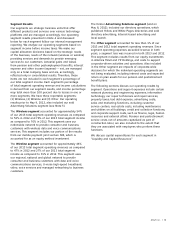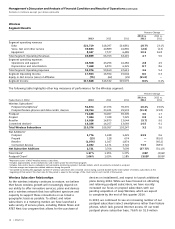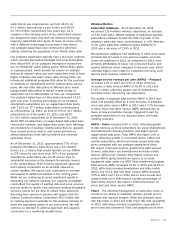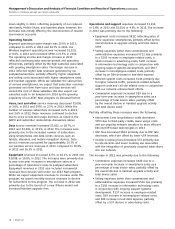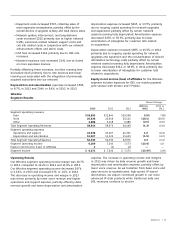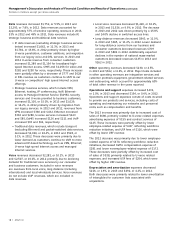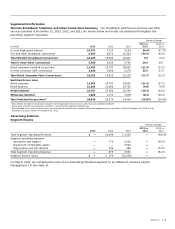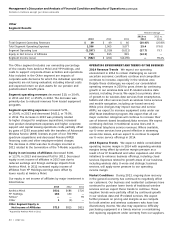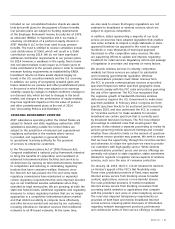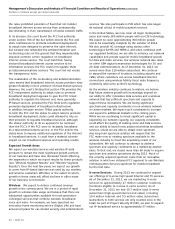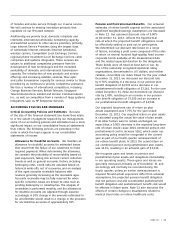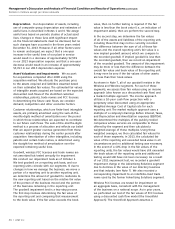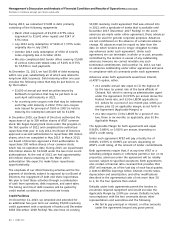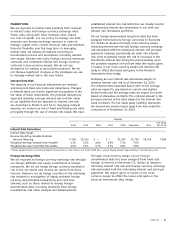AT&T Wireless 2013 Annual Report Download - page 25
Download and view the complete annual report
Please find page 25 of the 2013 AT&T Wireless annual report below. You can navigate through the pages in the report by either clicking on the pages listed below, or by using the keyword search tool below to find specific information within the annual report.
AT&T Inc. | 23
traffic. The order adopts rules to address immediately
certain practices that artificially increase ICC payments,
as well as other practices to avoid such payments.
The order also establishes a new ICC regime that will
result in the elimination of virtually all terminating switched
access charges and reciprocal compensation payments
over a six-year transition. In the order, the FCC also
repurposed its high-cost universal service program to
encourage providers to deploy broadband facilities in
unserved areas. To accomplish this goal, the FCC is
transitioning support amounts disbursed through its existing
high-cost program to its new Connect America Fund (CAF).
In 2013, the FCC awarded us approximately $100 in new
CAF funding to deploy broadband in unserved areas.
We support many aspects of the order and new rules.
AT&T and other parties have filed appeals of the FCC’s
rules, which are pending in the Tenth Circuit Court of
Appeals. Our appeal challenges only certain, narrow
aspects of the order; AT&T intervened in support of the
broad framework adopted by the order. Oral argument
on the appeal took place November 19, 2013. A decision
is possible in 2014. We do not expect the FCC’s rules to
have a material impact on our operating results.
Transition to IP-Based Network In conjunction with
Project VIP, we filed a petition with the FCC asking it to open
a proceeding to facilitate our transition to all IP-based
networks and services to promote consumer interests and
incent private investment in broadband infrastructure.
On January 30, 2014, the FCC adopted an order authorizing
a broad set of voluntary experiments to measure the impact
on consumers of the IP transition. Among other things, the
order invites providers to submit proposals for all-IP trials in
discrete geographic areas. In the first quarter of 2014,
AT&T expects to submit a detailed plan for two such trials.
The FCC will put that detailed plan out for public comment,
and expects to adopt an order regarding AT&T’s plan by the
end of the second quarter of 2014. We expect this transition
to take several years.
Net Neutrality On January 14, 2014, the D.C. Circuit
released its decision on Verizon’s appeal of the FCC’s Net
Neutrality rules. As discussed above, although the court
found that the FCC generally has authority to adopt Net
Neutrality rules, the court vacated and remanded the
FCC’s antidiscrimination and no-blocking rules on the
ground that they impermissibly imposed common carrier
regulation on broadband Internet access service (the court
upheld the transparency requirements). That decision
means that broadband Internet access providers have
greater flexibility in their provision of mass market services.
But the court’s finding that the FCC has authority to adopt
rules to promote broadband deployment appears to give
the FCC broad authority to regulate the Internet and,
more generally, IP-based services. In addition, the court’s
rationale appears to give the states authority to adopt
rules to promote broadband deployment, although
customer locations, including U-verse services to a total
of 33 million customer locations. We expect to be
substantially complete in the 2015 and 2016 timeframe.
We believe that our U-verse TV service is a “video service”
under the Federal Communications Act. However, some
cable providers and municipalities have claimed that certain
IP services should be treated as a traditional cable service
and therefore subject to the applicable state and local
cable regulation. Petitions have been filed at the FCC
alleging that the manner in which we provision “public,
educational and governmental” (PEG) programming over
our U-verse TV service conflicts with federal law, and a
lawsuit has been filed in a California state superior court
raising similar allegations under California law. If courts
having jurisdiction where we have significant deployments
of our U-verse services were to decide that federal, state
and/or local cable regulation were applicable to our
U-verse services, or if the FCC, state agencies or the courts
were to rule that we must deliver PEG programming in a
manner substantially different from the way we do today
or in ways that are inconsistent with our current network
architecture, it could have a material adverse effect on
the cost and extent of our U-verse offerings.
REGULATORY DEVELOPMENTS
Set forth below is a summary of the most significant
regulatory proceedings that directly affected our operations
during 2013. Industry-wide regulatory developments are
discussed above in Operating Environment Overview.
While these issues may apply only to certain subsidiaries,
the words “we,” “AT&T” and “our” are used to simplify
the discussion. The following discussions are intended
as a condensed summary of the issues rather than as a
comprehensive legal analysis and description of all of
these specific issues.
International Regulation Our subsidiaries operating
outside the United States are subject to the jurisdiction
of regulatory authorities in the market where service is
provided. Our licensing, compliance and advocacy initiatives
in foreign countries primarily enable the provision of
enterprise (i.e., large-business) services. AT&T is engaged
in multiple efforts with foreign regulators to open markets
to competition, reduce network costs, foster conditions
favorable to investment, and increase our scope of fully
authorized network services and products.
Federal Regulation A summary of significant 2013
federal regulatory developments follows.
Intercarrier Compensation/Universal Service In
October 2011, the FCC adopted an order fundamentally
overhauling its high-cost universal service program,
through which it disburses approximately $4,500 per year
to carriers providing telephone service in high-cost areas,
and its existing intercarrier compensation (ICC) rules, which
govern payments between carriers for the exchange of


